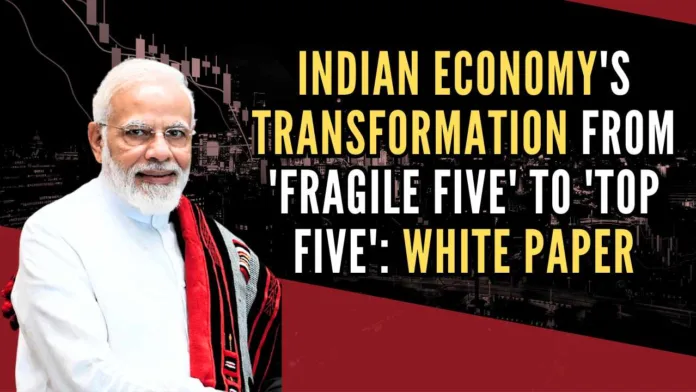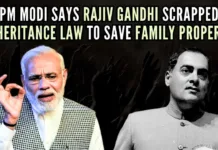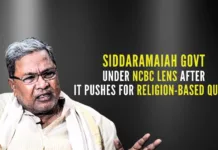
White Paper: Progress achieved in the 10 yrs of the Modi govt has overcome the malaise and paralysis of the previous 10 yrs of UPA govt
White Paper: Comparing the performance of the 10-year rule of the Narendra Modi government with that of the erstwhile UPA regime, the White Paper on Indian Economy tabled in the Lok Sabha by Finance Minister Nirmala Sitharaman highlights the fact that in 2014, India was among the ‘fragile five‘ economies, but now figures among the ‘top five‘ economies, making the third highest contribution to global growth every year.
“When the NDA government took over the reins in 2014, the economy was in a crisis. We faced the hydra-headed challenge of fixing an economy that was mismanaged for a decade, and restoring its fundamentals to sound health,” the White Paper said.
It goes on to present a ‘Then and Now’ scenario of the comparison to drive home its point:
- Then, the world had lost confidence in India’s economic potential and dynamism; now, with our economic stability and growth prospects, we inspire hope in others. It cites the perceptions of two major international organizations.
- Then, we had a scam-riddled 12-day Commonwealth Games; now, we successfully hosted a far-bigger and year-long G20 Presidency in 2023, showcasing India at its best in terms of content, consensus, and logistics, providing acceptable solutions to global problems.
- Then, we had a 2G scam; now, we have extensive coverage of the population under 4G with the lowest rates and the world’s fastest rollout of 5G in 2023.
- Then, we had the Coalgate scam; now, we have built systems for transparent and objective auctions for harnessing natural resources to boost the economy and the public finances.
- Then we provided gold import license for a chosen few; now, we have set up a bullion exchange in GIFT IFSC with a transparent mechanism for import.
- Then, we had the economy facing a ‘twin balance sheet problem’; now, we have turned the economy to have a ‘twin balance sheet advantage’ for companies as well as the banking sector with ample capacity to ramp up investments and credit and generate employment.
- Then, we had double-digit inflation; now, inflation has been brought down to a little over 5 percent.
- Then, we had a foreign exchange crisis; now, we have record foreign exchange reserves of over USD 620 billion.
- Then, we had ‘policy-paralysis‘; infrastructure was not a priority; now, the wheels of the virtuous cycle of ‘investment, growth, employment and entrepreneurship, and savings’ leading to more investments and productivity have been set into fast motion.
- Then, we had sporadic coverage of development programs; now, we have ‘saturation coverage‘ for providing necessities for all, with measured, targeted, and inclusive support for the needy and empowerment of all to pursue their aspirations.
- In sum, the progress achieved in the ten years of our government has overcome the malaise and paralysis of the previous ten years of the UPA government.
In 2024, confidence and purpose have replaced the diffidence and drift of 2014, the paper stated as it listed selected socio-economic indicators such as the alleviation of poverty and the creation of more employment.
“Our government, armed with political and policy stability, recognized the need to make tough decisions for the greater economic good… Rather than employing quick fixes, we undertook bold reforms to nurture the coming decades of economic performance,” it said.
Contrasting its style of functioning with the UPA, the White Paper asserted that the Modi government, unlike its predecessor, invested in the foundations of the economy along with building a sturdy superstructure.
The White Paper concludes by saying that the government will not rest on its past laurels as the goal is to make India a “developed nation by 2047“.
[With Inputs from IANS]
For all the latest updates, download PGurus App.










